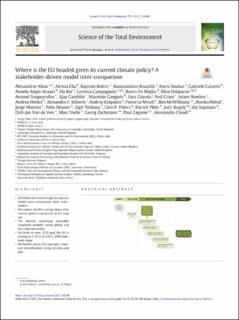| dc.contributor.author | Nikas, Alexandros | |
| dc.contributor.author | Elia, Alessia | |
| dc.contributor.author | Boitier, Baptiste | |
| dc.contributor.author | Koasidis, Konstantinos | |
| dc.contributor.author | Doukas, Haris | |
| dc.contributor.author | Cassetti, Gabriele | |
| dc.contributor.author | Anger-Kraavi, Annela | |
| dc.contributor.author | Bui, Ha | |
| dc.contributor.author | Campagnolo, Lorenza | |
| dc.contributor.author | De Miglio, Rocco | |
| dc.contributor.author | Delpiazzo, Elisa | |
| dc.contributor.author | Fougeyrollas, Arnaud | |
| dc.contributor.author | Gambhir, Ajay | |
| dc.contributor.author | Gargiulo, Maurizio | |
| dc.contributor.author | Giarola, Sara | |
| dc.contributor.author | Grant, Neil | |
| dc.contributor.author | Hawkes, Adam | |
| dc.contributor.author | Herbst, Andrea | |
| dc.contributor.author | Köberle, Alexandre C. | |
| dc.contributor.author | Kolpakov, Andrey | |
| dc.contributor.author | Le Mouël, Pierre | |
| dc.contributor.author | McWilliams, Ben | |
| dc.contributor.author | Mittal, Shivika | |
| dc.contributor.author | Moreno, Jorge | |
| dc.contributor.author | Neuner, Felix | |
| dc.contributor.author | Perdana, Sigit | |
| dc.contributor.author | Peters, Glen Philip | |
| dc.contributor.author | Plötz, Patrick | |
| dc.contributor.author | Rogelj, Joeri | |
| dc.contributor.author | Sognnæs, Ida Andrea Braathen | |
| dc.contributor.author | Van de Ven, Dirk-Jan | |
| dc.contributor.author | Vielle, Marc | |
| dc.contributor.author | Zachmann, G. | |
| dc.contributor.author | Zagamé, Paul | |
| dc.contributor.author | Chiodi, Alessandro | |
| dc.coverage.spatial | Europa | en_US |
| dc.date.accessioned | 2022-03-24T09:35:52Z | |
| dc.date.available | 2022-03-24T09:35:52Z | |
| dc.date.created | 2022-03-01T13:28:57Z | |
| dc.date.issued | 2021 | |
| dc.identifier.citation | Science of the Total Environment. 2021, 793 . | en_US |
| dc.identifier.issn | 0048-9697 | |
| dc.identifier.uri | https://hdl.handle.net/11250/2987259 | |
| dc.description.abstract | Recent calls to do climate policy research with, rather than for, stakeholders have been answered in non-modelling science. Notwithstanding progress in modelling literature, however, very little of the scenario space traces back to what stakeholders are ultimately concerned about. With a suite of eleven integrated assessment, energy system and sectoral models, we carry out a model inter-comparison for the EU, the scenario logic and research questions of which have been formulated based on stakeholders' concerns. The output of this process is a scenario framework exploring where the region is headed rather than how to achieve its goals, extrapolating its current policy efforts into the future. We find that Europe is currently on track to overperforming its pre-2020 40% target yet far from its newest ambition of 55% emissions cuts by 2030, as well as looking at a 1.0–2.35 GtCO2 emissions range in 2050. Aside from the importance of transport electrification, deployment levels of carbon capture and storage are found intertwined with deeper emissions cuts and with hydrogen diffusion, with most hydrogen produced post-2040 being blue. Finally, the multi-model exercise has highlighted benefits from deeper decarbonisation in terms of energy security and jobs, and moderate to high renewables-dominated investment needs. | en_US |
| dc.language.iso | eng | en_US |
| dc.publisher | Elsevier | en_US |
| dc.rights | Navngivelse 4.0 Internasjonal | * |
| dc.rights.uri | http://creativecommons.org/licenses/by/4.0/deed.no | * |
| dc.subject | Europe | en_US |
| dc.subject | Energy system models | en_US |
| dc.subject | Model inter-comparison | en_US |
| dc.subject | Stakeholder engagement | en_US |
| dc.subject | Climate policy | en_US |
| dc.subject | Integrated assessment models | en_US |
| dc.title | Where is the EU headed given its current climate policy? A stakeholder-driven model inter-comparison | en_US |
| dc.type | Journal article | en_US |
| dc.type | Peer reviewed | en_US |
| dc.description.version | publishedVersion | en_US |
| dc.source.pagenumber | 0 | en_US |
| dc.source.volume | 793 | en_US |
| dc.source.journal | Science of the Total Environment | en_US |
| dc.identifier.doi | 10.1016/j.scitotenv.2021.148549 | |
| dc.identifier.cristin | 2006696 | |
| dc.relation.project | EC/H2020/820846 | en_US |
| cristin.ispublished | true | |
| cristin.fulltext | original | |
| cristin.qualitycode | 2 | |

